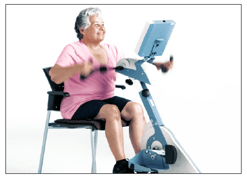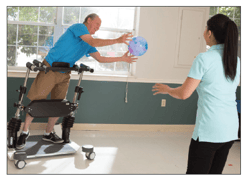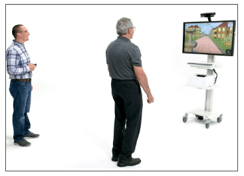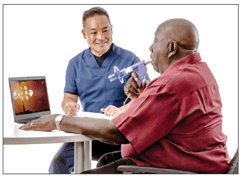According to the CDC, dementia affects one’s ability to remember, think, and make decisions that impact daily activities and safety. Alzheimer’s disease (AD) is the most common type of dementia accounting for 60-80% of cases. As dementia progresses to increased levels of memory loss and confusion, the individual becomes more sedentary and frail. Rehabilitation in this population should be tailored to patient needs addressing cognition, strength, gait, balance, endurance, and function.
Research:
- Promoting lifestyle changes to include regular exercise in pre-symptomatic individuals may have the potential for delaying one-third of dementias worldwide. (De la Rosa et al., 2020)
- A systematic review found strong evidence for the use of physical exercise in people with mild cognitive impairment (MCI) or mild-to-moderate dementia to improve strength, sit-to-stand, step length, balance, walking speed, and endurance.
(Lam et al., 2018) - Individuals with AD who performed six months of aerobic exercise (progressing from 60 to 150 minutes/week) had increased cardiorespiratory fitness resulting in improved memory performance. (Morris et al., 2017)
Advanced Rehab Technology can play a role in the rehabilitation of individuals with dementia.

OmniCycle® includes upper and lower extremity cycling to improve strength, endurance, and coordination. Patient participation is increased with virtual reality biofeedback activities that are selected based on performance.

OmniStand® assists therapists by providing the patient with an appropriate level of support to challenge and progress balance and improves sense of security while performing activities.

OmniVR® engages and challenges cognitive and physical abilities within a virtual environment. Exercises can be simplified to allow for less visual stimulation, as needed for patients with dementia.

OmniFlow® includes inspiratory/expiratory exercise coupled with virtual reality biofeedback activities to improve respiratory muscle power and rhythmical breathing for better ventilation, core stability, endurance, and airway clearance.
References:
De la Rosa, A., Olaso-Gonzalez, G., Arc-Chagnaud, C., Millan, F., Salvador-Pascual, A., García-Lucerga, C., Blasco-Lafarga, C., Garcia-Dominguez, E., Carretero, A., Correas, A. G., Viña, J., & Gomez-Cabrera, M. C. (2020).
Physical exercise in the prevention and treatment of Alzheimer’s disease. Journal of sport and health science, 9(5), 394–404. https://doi.org/10.1016/j.jshs.2020.01.004
Morris, J. K., Vidoni, E. D., Johnson, D. K., Van Sciver, A., Mahnken, J. D., Honea, R. A., Wilkins, H. M., Brooks, W. M., Billinger, S. A., Swerdlow, R. H., & Burns, J. M. (2017). Aerobic exercise for Alzheimer’s disease:
A randomized controlled pilot trial. PloS one, 12(2), e0170547. https://doi.org/10.1371/journal.pone.0170547
Lam, F. M., Huang, M. Z., Liao, L. R., Chung, R. C., Kwok, T. C., & Pang, M. Y. (2018). Physical exercise improves strength, balance, mobility, and endurance in people with cognitive impairment and dementia: a systematic
review. Journal of physiotherapy, 64(1), 4–15. https://doi.org/10.1016/j.jphys.2017.12.001
